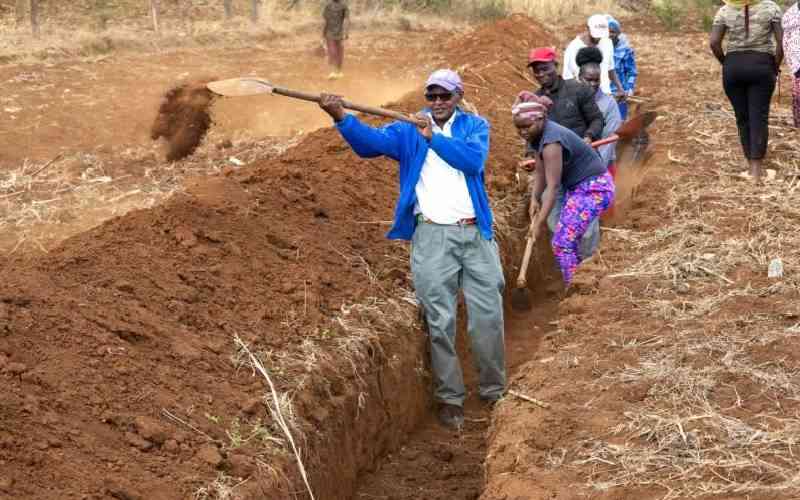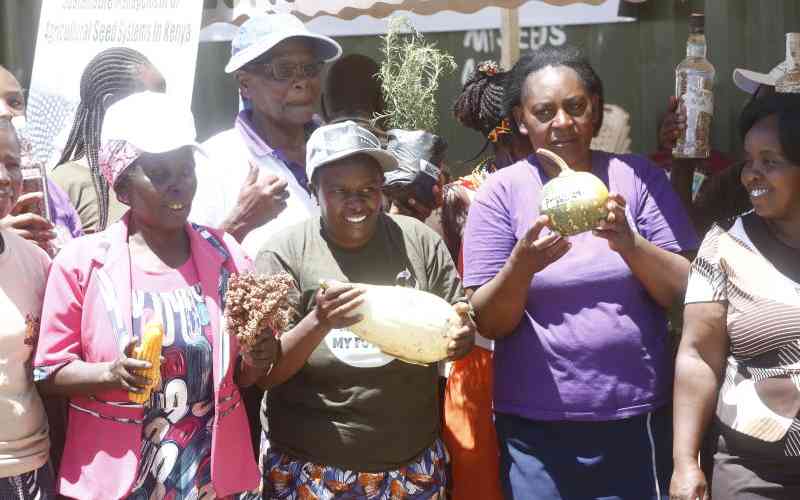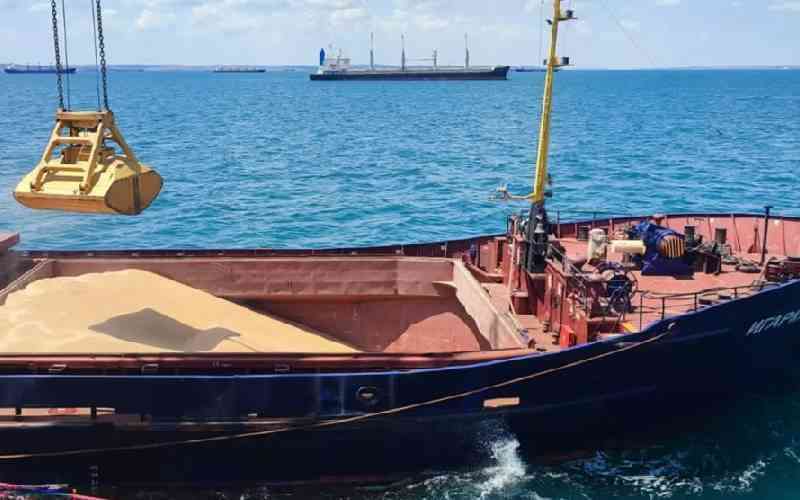 |
|
Koli Mutisya shells maize. [PHOTOS: PAUL MUTUA/STANDARD] |
By PHILIP MUASYA
Kitui, Kenya: Around this time two years ago, residents of sun baked Tseikuru District in Kitui County solely depended on government relief food.
School children suffered from malnutrition and stunted growth due to persistent famine.
But thanks to a multi-billion shillings irrigation project started by former Vice President Kalonzo Musyoka, the region which has for decades suffered from the vagaries of harsh weather is gradually transforming.
Started in 2011, the massive Usueni/Wikithuki Irrigation project expected to cover 5,000 acres will cost Sh3 billion on completion.
Already 450 acres of land are under furrow irrigation where farmers grow maize, beans, watermelons and other horticultural crops.
The first phase will cost the government Sh300 million as bulldozers continue to clear the ground for expansion of the scheme.
Every morning trucks transport produce from the farms to Tseikuru, Kyuso and Mwingi towns.
When The Standard on Sunday visited the scheme during a thanks giving prayer service for the first produce, the area that once stood bare, characterised by dusty whirlwind was rich with green fields bursting with life.
The prayers presided over by Machakos Diocese ACK Bishop Joseph Mutungi were attended by Kalonzo, Kitui Governor Julius Malombe, Kitui Senator David Musila, five MPs and members of Kitui County Assembly led by Speaker George Ndotto.
As prayers went on, locals munched boiled green maize as they marvelled at the wonder project which has given them a new lease of life.
Mr Joshua Mutisya, a farmer was all smiles as he sprayed his maize crop with a chemical while Ms Kasilu Musyimi harvested her produce.
“Famine has been the hallmark of this region for as long as I can remember but with this project, our lives have changed. It is a dream come true. There is no more hunger amongst our people,” Mutisya said.
Like other farmers, Mutisya and Musyimi own one acre piece of land under maize and beans. Coming at an off season dry month in Ukambani when temperatures are hovering at 35 degrees Celsius, the healthy cover of green maize and vegetables is akin to a miracle.
Water is pumped from River Tana that cuts across the region into a giant cemented reservoir at the heart of the farms from where it is diverted using canals, with intersecting joints, to feed individual farms through furrow irrigation.
Stay informed. Subscribe to our newsletter
The former VP said the project is expected to end the dependency on unreliable rain-fed agriculture and save the country billions of shillings spend on relief food for famine stricken residents.
“We anticipate the project will attract investors in cash crop and dairy farming and fruit processing,” Kalonzo said. He expressed optimism that the project will transform the arid Mwingi region and feed the entire Ukambani region.
Dr Malombe said his administration’s main agenda was to fight food and water insecurity and the irrigation scheme was a good start.
He said the county’s security, education and health goals cannot be achieved when locals are hungry and announced that he had allocated Sh1 billion out of the Sh6.5 billion budget for agricultural activities.
Tseikuru DC Stephen Momanyi said: “The project will solve the long-standing pastoralist conflict in the area by creating a buffer zone while at the same time feeding the hungry.” Overtime pastoralists from Tana River County have strayed into the area in search of pasture leading to conflict with locals.
Food security
Mr Nzomo Kakuru, 52, is the chairman of Wikithuki Cooperative Irrigation Society which has 3, 000 members, who are expecting bumper harvest as they prepare their farms for the next crop.
“Farmers are now able to feed their families, pay for their children’s school fees and meet other obligations,” Kakuru said. He explained that shares are sold at Sh200 each with a minimum of two shares per farmer. A farmer cannot hold a fifth of all shares.
Mwingi North legislator John Munuve said his constituents who are mainly subsistence farmers have the advantage of exploiting the waters of River Tana to improve food security in the area.
The project, to be done in several phases, is being undertaken by the National Irrigation Board which has contracted Unibee Construction Limited to carry out the infrastructural works.
Site engineer Richard Kanui, said farmers can harvest between 20 and 30 bags of maize per acre.
“Sh300 million has been spent in the first phase to facilitate the project take off and 500 most needy selected farmers are the first beneficiaries of the irrigation scheme” he said adding that already the scheme had so far created more than 1,000 direct jobs. Kanui said 100 acres will be put under furrow irrigation, 200 acres under drip irrigation and 200 acres under sprinkler irrigation.
The contractor Mr Joseph Claudia said the first phase is 90 per cent complete and it will take one month to complete the rest.
“Currently, we are pumping water from the river and distributing it using canals. We expect better yields when farmers start adopting drip and sprinkler irrigation” he said. He explained that the farmers who are new to irrigation concept need the services of agricultural extension officers to be able to reap benefits from the project.
And the government is constructing an airstrip to facilitate transportation of produce from Tseikuru market.
Once the project is complete, NIB in conjunction with Ministry of Agriculture will train farmers for one year on how to take care of the canals, irrigation kits and cash crop farming before handing it over to the cooperative society.
The locals say the project is God send and a lasting solution to improving Kitui County economy and end poverty in the drought ravaged semi arid region.
 The Standard Group Plc is a
multi-media organization with investments in media platforms spanning newspaper
print operations, television, radio broadcasting, digital and online services. The
Standard Group is recognized as a leading multi-media house in Kenya with a key
influence in matters of national and international interest.
The Standard Group Plc is a
multi-media organization with investments in media platforms spanning newspaper
print operations, television, radio broadcasting, digital and online services. The
Standard Group is recognized as a leading multi-media house in Kenya with a key
influence in matters of national and international interest.
 The Standard Group Plc is a
multi-media organization with investments in media platforms spanning newspaper
print operations, television, radio broadcasting, digital and online services. The
Standard Group is recognized as a leading multi-media house in Kenya with a key
influence in matters of national and international interest.
The Standard Group Plc is a
multi-media organization with investments in media platforms spanning newspaper
print operations, television, radio broadcasting, digital and online services. The
Standard Group is recognized as a leading multi-media house in Kenya with a key
influence in matters of national and international interest.









